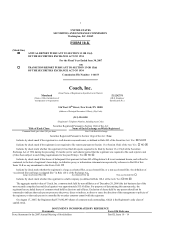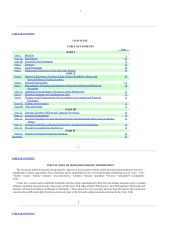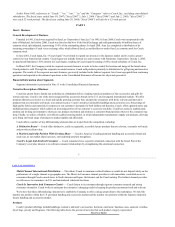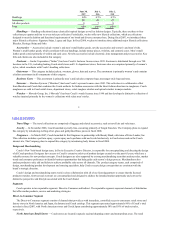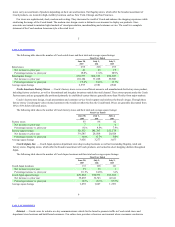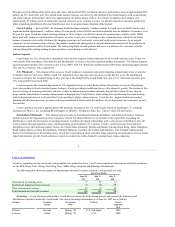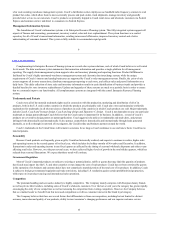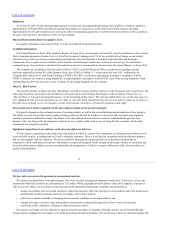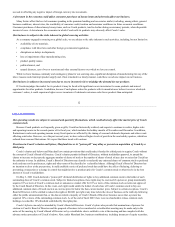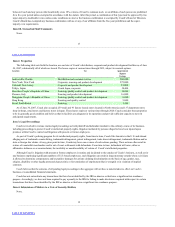Coach 2006 Annual Report Download - page 10
Download and view the complete annual report
Please find page 10 of the 2006 Coach annual report below. You can navigate through the pages in the report by either clicking on the pages listed below, or by using the keyword search tool below to find specific information within the annual report.
succeed in offsetting any negative impact of foreign currency rate movements.
A downturn in the economy could affect consumer purchases of luxury items and adversely affect our business.
Many factors affect the level of consumer spending in the premium handbag and accessories market, including, among others, general
business conditions, interest rates, the availability of consumer credit, taxation and consumer confidence in future economic conditions.
Consumer purchases of discretionary luxury items, such as Coach products, tend to decline during recessionary periods, when disposable
income is lower. A downturn in the economies in which Coach sells its products may adversely affect Coach’s sales.
Our business is subject to the risks inherent in global sourcing activities.
As a company engaged in sourcing on a global scale, we are subject to the risks inherent in such activities, including, but not limited to:
•availability of raw materials,
•compliance with labor laws and other foreign governmental regulations,
•disruptions or delays in shipments,
•loss or impairment of key manufacturing sites,
•product quality issues,
•political unrest, and
•natural disasters, acts of war or terrorism and other external factors over which we have no control.
While we have business continuity and contingency plans for our sourcing sites, significant disruption of manufacturing for any of the
above reasons could interrupt product supply and, if not remedied in a timely manner, could have an adverse impact on our business.
Our business is subject to increased costs due to excess inventories if we misjudge the demand for our products.
If Coach misjudges the market for its products it may be faced with significant excess inventories for some products and missed
opportunities for other products. In addition, because Coach places orders for products with its manufacturers before it receives wholesale
customers’ orders, it could experience higher excess inventories if wholesale customers order fewer products than anticipated.
12
Our operating results are subject to seasonal and quarterly fluctuations, which could adversely affect the market price of Coach
common stock.
Because Coach products are frequently given as gifts, Coach has historically realized, and expects to continue to realize, higher sales
and operating income in the second quarter of its fiscal year, which includes the holiday months of November and December. In addition,
fluctuations in sales and operating income in any fiscal quarter are affected by the timing of seasonal wholesale shipments and other events
affecting retail sales. However, over the past several years, we have achieved higher levels of growth in the non holiday quarters, which has
reduced these seasonal fluctuations. We expect that these trends will continue.
Provisions in Coach’s charter and bylaws, Maryland law or its “poison pill” may delay or prevent an acquisition of Coach by a
third party.
Coach’s charter and bylaws and Maryland law contain provisions that could make it harder for a third party to acquire Coach without
the consent of Coach’s Board of Directors. Coach’s charter permits its Board of Directors, without stockholder approval, to amend the
charter to increase or decrease the aggregate number of shares of stock or the number of shares of stock of any class or series that Coach has
the authority to issue. In addition, Coach’s Board of Directors may classify or reclassify any unissued shares of common stock or preferred
stock and may set the preferences, rights and other terms of the classified or reclassified shares. Although Coach’s Board of Directors has
no intention to do so at the present time, it could establish a series of preferred stock that could have the effect of delaying, deferring or
preventing a transaction or a change in control that might involve a premium price for Coach’s common stock or otherwise be in the best
interest of Coach’s stockholders.
On May 3, 2001 Coach declared a “poison pill” dividend distribution of rights to buy additional common stock to the holder of each
outstanding share of Coach’s common stock. Subject to limited exceptions, these rights may be exercised if a person or group intentionally
acquires 10% or more of Coach’s common stock or announces a tender offer for 10% or more of the common stock on terms not approved
by the Coach Board of Directors. In this event, each right would entitle the holder of each share of Coach’s common stock to buy one
additional common share of Coach stock at an exercise price far below the then-current market price. Subject to certain exceptions, Coach’s
Board of Directors will be entitled to redeem the rights at $0.0001 per right at any time before the close of business on the tenth day following
either the public announcement that, or the date on which a majority of Coach’s Board of Directors becomes aware that, a person has
acquired 10% or more of the outstanding common stock. As of the end of fiscal 2007, there were no shareholders whose common stock
holdings exceeded the 10% threshold established by the rights plan.
Coach’s bylaws can only be amended by Coach’s Board of Directors. Coach’s bylaws also provide that nominations of persons for
election to Coach’s Board of Directors and the proposal of business to be considered at a stockholders meeting may be made only in the
notice of the meeting, by Coach’s Board of Directors or by a stockholder who is entitled to vote at the meeting and has complied with the
advance notice procedures of Coach’s bylaws. Also, under Maryland law, business combinations, including issuances of equity securities,

